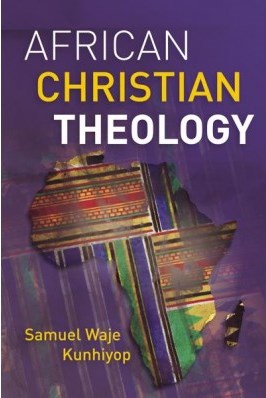Samuel Waje Kunhiyop: African Christian Theology
 Samuel Waje Kunhiyop, African Christian Theology (Hippo Books/Zondervan, 2012), 250 pages, ISBN 9789966003164.
Samuel Waje Kunhiyop, African Christian Theology (Hippo Books/Zondervan, 2012), 250 pages, ISBN 9789966003164.
Theology as a reflection on God and his creatures is eternal, but some of the questions we ask and our discourse about God are rooted in our experiences, cultural beliefs and worldview. Therefore our understanding of theology is also rooted in our culture. The author, Professor Samuel Kunhiyop, (the current ECWA General Secretary and Professor of Ethic at Bingham University, Karu, Nigeria) fully aware of this, produced African Christian Theology sequel to his African Christian Ethics. In this book, Kunhiyop discusses a myriad of themes and topics in African Christian Theology. This book, therefore, constitutes an excellent introduction to systematic theology in relation to the traditional African worldview. The book can be referred to as “African Systematic Theology”. The book is written to address questions that arise from an African context. It helps readers to discover how theology affects our minds, our hearts and our lives. It is a sort of contextual theology. If Christian theology will be relevant to the occasion of any local people, it must take in to consideration the context in which theology will be done, particularly their cultural worldview (this is Ngugi Moshete’s thesis).
Professor Samuel Waje Kunhiyop exemplified this fact in the book. He sets out his method from the outset of the book “though I write as one who is convinced that Christianity based on biblical revelation stands above other religions, but my own understanding of Christianity in African context is that it should take African situation seriously while seeking to be true and explicit teachings of the scripture.” The author maintains that “Scripture is always interpreted within a context; Africa is the context in which I seek the true meaning of Scripture” (Samuel Waje Kunhiyop, pxiii). With this view, the author explores traditional African worldview about God and how he reveals himself. The book, though simplified and abridged (as said by the author), is divided into ten chapters with one appendix. Each chapter covers the major themes of systematic theology in a lucid manner. That is, the book seeks to articulate theologies in a way that ordinary Christian can understand. To ensure that the book actualizes its purpose, the author sets out some important hints on how to get the most of the book. In this thematic analysis in each chapter of the goal the author sets to achieve is to “articulate a theology that originates from an authentic search for the meaning of Scripture in order to apply it to contemporary African life” (p.xiii).
One of the most important functions any biblically-based theology is its practical effect on the lives of Christians.
Category: In Depth, Winter 2016


